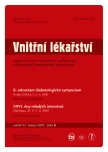Sensorineural hearing loss in diabetes. Prosthetic care in hearing impaired patients
Authors:
O. Dlouhá
Authors‘ workplace:
Foniatrická klinika 1. Lékařské fakulty UK a VFN, Praha, přednostka doc. MUDr. Olga Dlouhá, CSc.
Published in:
Vnitř Lék 2007; 53(5): 528-533
Category:
Overview
Sensorineural hearing loss is more common in patients with diabetes than in the control nondiabetic patients, and severity of hearing loss seemed to correlate with progression of disease. This may be due to microangiopathic disease in the inner ear. References for diabetic microangiopathy are presented. Sensorineural hearing loss can often be helped by hearing aids. During the last decade there have been significant developments in hearing aid technology. Progress began with the presentation of programmable hearing aids in the late 1980-ies. The first hearing aids with fully digital signal processing became commercially available in 1995. The hearing aid is programmable, which means that it can be adjusted individually by a hearing healthcare professional (hearing aid fitting at departments of phoniatrics and of audiology in our country). The article gives an outline of indications for hearing aids.
Key words:
sensorineural hearing loss – diabetes mellitus – hearing aids
Sources
1. Novák A. Stolní manuál audiologie. Praha: Unitisk 2001.
2. Kakarlapudi V, Sawyer R, Staecker H. The effect of diabetes on sensorineural hearing loss. Otology and Neurootology 2003; 24 : 382-386.
3. Vaughan N, James K, Mcdermott D et al. A 5-year prospective study of diabetes and hearing loss in a veteran population. Otology and Neurootology 2006; 27 : 37-43.
4. Gawron W, Pospiech L, Noczynska A et al. Sudden hearing loss as a first complication of long-standing type 1 diabetes mellitus. Diabet Med 2004; 21 : 96-98.
5. Fukui M, Kitagawa Y, Nakanuta N et al. Idiopathic sudden hearing loss in patients with type 2 diabetes. Diabetes Res Clin Pract 2004; 63 : 205-211.
6. Elamin A, Fadllah M, Tuvemo T Hearing loss in children with DM 1. Indian Pediatr 2005; 42 : 15-21.
7. Chen JN, Lion CW, Juany CC et al. Maternally Inherited Diabetes and Deafness Syndrome (MIDD). Chang Gung Med J 2004; 27 : 66-73.
8. Lien LM, Lee HC, Wang KL et al. Involved of nervous system in maternally inherited diabetes and deafness (MIDD) with the A3243G mutation of mitochondrial DNA. Acta Neurol Scand 2001; 103 : 159-165.
9. Guillausseau PJ, Kasein P, Dubois D et al. Maternally inherited diabetes and deafness: multicenter study. Ann Intern Med 2001; 134 : 721-728.
10. Schleiffr T, Hart LM, Schuzfeld C et al. Maternally inherited diabetes and deafness (MIDD). Exp Clin Endocrinol Diabetes 2000; 108 : 81-85.
11. Noguchi Y, Yashima T, Hatanaka A et al. A mutation in Wolfram syndrome type 1 gene in a japanese family with autosomal dominant low-frequency sensorineural hearing loss. Acta Otolaryngol 2005; 125 : 1189-1194.
12. Novák A. Moderní protetická péče o sluchově postižené. Otorinolaryngie a foniatrie (Prague) 2004; 53 : 115-120.
Labels
Diabetology Endocrinology Internal medicineArticle was published in
Internal Medicine

2007 Issue 5
-
All articles in this issue
- Outline of the physiology and pathophysiology of the senses
- Olfaction and gustation in diabetes
- Diabetes mellitus and cognitive impairments
- Examination of tactile disorders in diabetic patients and cooperation with a neurologist
- Diabetic ophthalmopathy
- Pathogenesis of diabetic retinopathy
- Cataracts, glaucoma and diabetes mellitus
- Surgical treatment of diabetic retinopathy
- Pharmacological treatment of diabetic retinopathy
- Inflammatory diseases of the eye
- Thyroid orbitopathy and diabetes
- Sensorineural hearing loss in diabetes. Prosthetic care in hearing impaired patients
- Tinnitus and diabetes
- Development of opinions on physical exercise for diabetics
- Exercise therapy for patients with metabolic syndrome
- Metabolic importance of muscles and the role of sports in diabetic patients
- Nutrition for diabetics in relation to physical exertion
- Therapeutic regimes accompanying physical exercise for diabetics
- Increased activity of the sympathetic nervous system and the possibilities for therapeutic influence
- Defining the level of physical activity for a diabetic who is obese
- Physical activity centre VŠTJ MEDICINA Prague – rehabilitation for diabetics
- Rehabilitation and prosthetic care for diabetic patients after the extremity amputation
- Editorial
- Internal Medicine
- Journal archive
- Current issue
- Online only
- About the journal
Most read in this issue
- Inflammatory diseases of the eye
- Tinnitus and diabetes
- Increased activity of the sympathetic nervous system and the possibilities for therapeutic influence
- Olfaction and gustation in diabetes
